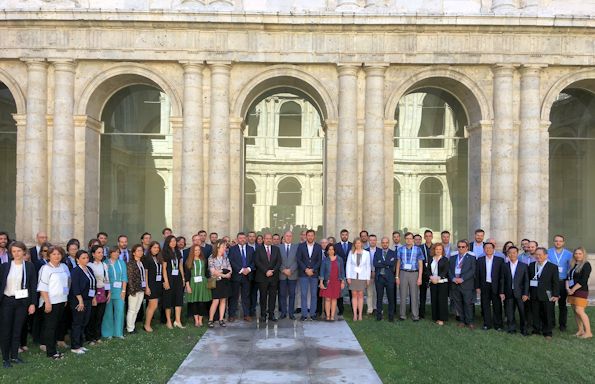
A major EU Nature-Based Solutions research project, which the University and the city is a key partner in, has been launched in Valladolid, Spain
Liverpool is one of three `front-runner cities’ in the project `URBAN GreenUP: New Strategy for Re-Naturing Cities through Nature-Based Solutions’ which is funded through the Horizon 2020 programme and involves a total of 26 academic and public sector partners from the cities of Liverpool, Valladolid and Imzir in Turkey.
The Liverpool aspect of the project, which also involves Liverpool City Council and Mersey Forest , will create a number of strategic `green corridors’ in key locations’ across the city.
Researchers from University’s School of Environmental Sciences and the Institute of Integrative Biology will provide in-depth research, experimental design of the technical solutions and practical testing and data analysis to the project.
Liverpool Biodiversity expert, Dr Sarah Clement, who attended the URBAN GreenUP project launch, said: “This is an exciting and innovative project which brings together experts and partners across Europe and beyond to examine exactly how making cities greener affects the health, economy, and ecology of urban places.
“URBAN GreenUP will draw upon Liverpool’s expertise in green infrastructure, environmental planning, and ecology. We look forward to providing both the evidence base and the practical tools needed to make cities more sustainable and resilient.”
Councillor James Noakes, Mayoral Lead for Energy and Smart City at Liverpool City Council, added: “Liverpool is delighted to be part of the URBAN GreenUP project and welcomes the opportunity to develop a Renaturing Urban Plan that will see the introduction of pedestrian and cycle friendly routes together with trees and other new innovative areas of planting such as ‘green’ walls and ‘green’ roofs on buildings into its urban centre.
“The City Council will work closely with our local project partners of the Mersey Forest and the University to trial, monitor and evaluate a range of different ‘greening’ schemes in the city. The project provides a wonderful opportunity to work with other countries and organisations, to share learning and best practice, and to explore the multifunctional benefits to the environment and economy that can be harnessed by bringing nature and biodiversity back into urban areas or by including them in regeneration and development initiatives.”
Project activities will begin in the three ‘front-runner’ cities and will be followed in five follower cities Mantova (Italy), Ludwigsburg (Germany), Medellin (Colombia), Chengdu (China) and Binh Dinh-Quy Nhon (Vietnam) who will directly learn from these experiences and set up their own re-naturing urban plans.
Raúl Sánchez-Francés, Project Coordinator of URBAN GreenUP, CARTIF, said: “URBAN GreenUP is a real opportunity to establish a solid methodology to re-nature our cities, providing a tool for public administration bodies, service providers, and citizens to transform cities in places where urban and natural conditions can co-exist. Through introducing nature back into cities it is hoped that the cities will become more sustainable and resilient and be better placed to cope with current and predicted climate change risks and other environmental and social challenges.
“Today Liverpool, Valladolid and Izmir jointly commit to develop their RUPs (Re-naturing Urban Plans) and to implement these ambitious interventions in their cities through URBAN GreenUP. More than 100 NBS interventions in the three cities will be delivered ensuring that not only the technology and innovation but also their related business models are researched and validated making URBAN GreenUP a reference for a new concept of EU cities.”
Further information on URBAN Greenup or you can follow @urbangreenUP on twitter.